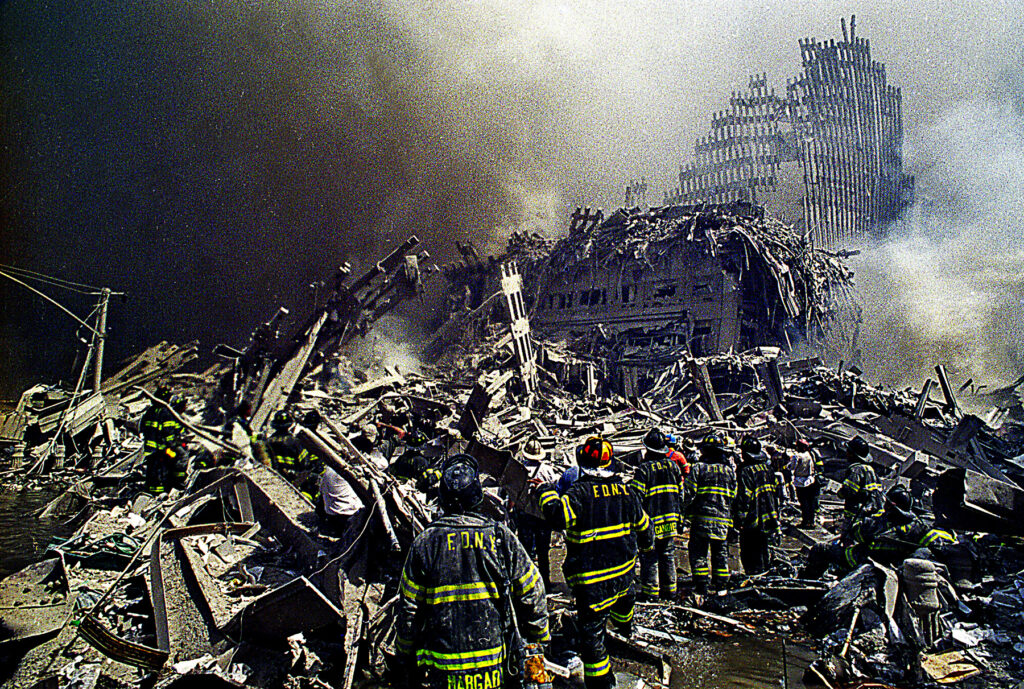🔴 Website 👉 https://u-s-news.com/
Telegram 👉 https://t.me/usnewscom_channel
Sept. 11, 2001, was a day of unspeakable tragedy.
Twenty-four years later, the images of the World Trade Center in flames still burn fresh in the minds of those who watched from afar and those who experienced it up close.
But amidst the chaos was a group of heroes — firefighters, police officers, paramedics and countless others — who ran toward the danger, risking their lives to save the lives of others.
They were our first responders, and in the face of death, they showed unwavering courage.
What many Americans didn’t see that day were the communication failures that made an already-impossible job even harder for these first responders.
Radios failed. Phone lines jammed.
Agencies from different states couldn’t coordinate effectively, resulting in first responders having to pass notes on pieces of paper around Ground Zero and the Pentagon to communicate.
Brave men and women entered the towers without any idea of what they were walking into because there was no way to talk to each other.
The National Institute of Standards and Technology even identified this as a factor in the deaths of 343 firefighters who couldn’t evacuate the World Trade Center.
Those failures were not abstract; they were personal.
Mayor Michael Bloomberg asked me to return as police commissioner following 9/11 to respond, rebuild and ensure America and New York were prepared.
I spoke to the families of men and women who never made it home, and I promised them their loved ones’ sacrifices would not be in vain.
We owed them more than gratitude. We owed them solutions.
That is why, years later, I was heartened to see Congress take decisive action to make certain this never happens again.
Yet now that effort is in danger of being derailed.
The First Responder Network Authority (FirstNet) finally became reality in 2017, during the first Trump administration.
For the first time in American history, first responders were given a communication network built specifically for them — the men and women who put on a uniform and charge head-on into danger while the rest of us can find safety.
A lot has changed in public safety since I made my first arrest in 1967.
Technology has revolutionized response communication in both everyday service and in times of crisis.
FirstNet ensures that during a hurricane, wildfire, mass shooting or terrorist attack, firefighters and EMTs can coordinate search and rescue, and police can communicate across jurisdictions in real time.
It’s what keeps lines open when commercial networks crash under pressure.
It recently helped first responders remain connected during Texas Hill Country’s devastating flash floods over the July Fourth weekend and continues to support the recovery efforts today.
Unlike commercial providers, FirstNet gives first responders an always-on priority and preemption.
Their calls and data go through first, no matter what.
It operates on a dedicated spectrum that serves more than 30,000 public-safety agencies and departments across the country.
Over the life of its contract, AT&T will return $18 billion back into the network to keep it strong.
And all of it is done without a dime of taxpayer money.
FirstNet represents responsible governance and a major victory for American strength: a government that empowers private enterprise to solve big problems without expanding the federal budget.
A vision where our heroes have what they need to save lives.
But FirstNet’s authorization is set to expire in 2027.
If Congress fails to act, we risk turning our backs on the people who rushed into the World Trade Center 24 years ago and those who respond to today’s emergencies, armed with courage and a network they can trust.
The House Energy and Commerce Committee just announced a Tuesday subcommittee hearing on the issue.
Reauthorizing FirstNet is supported by the very people who use it: the National Fraternal Order of Police, the International Association of Fire Fighters, the International Association of Chiefs of Police and the International Association of Fire Chiefs.
These are not partisan voices. These are Americans who know what failure looks like and what success feels like because they’ve lived both.
Not only that, FirstNet’s reauthorization honors the sacrifice of 9/11’s heroes and ensures future generations of first responders never face the same communication breakdowns.
It is a chance for Congress, and for President Trump, to double down on a vision that saves lives and strengthens America so that families may feel more secure in their communities.
I can say confidently that FirstNet stands as one of the most consequential and forward-looking investments in public safety this nation has ever seen.
On 9/11, we asked first responders to do the impossible, and they fearlessly put their lives on the line to do so.
Now, we can provide them with the tools to help make good on our vow never to let a tragedy like that happen again.
Let’s get it done.
Ray Kelly is the longest-serving NYPD commissioner, leading from 1992 to 1994 and from 2002 to 2013.
